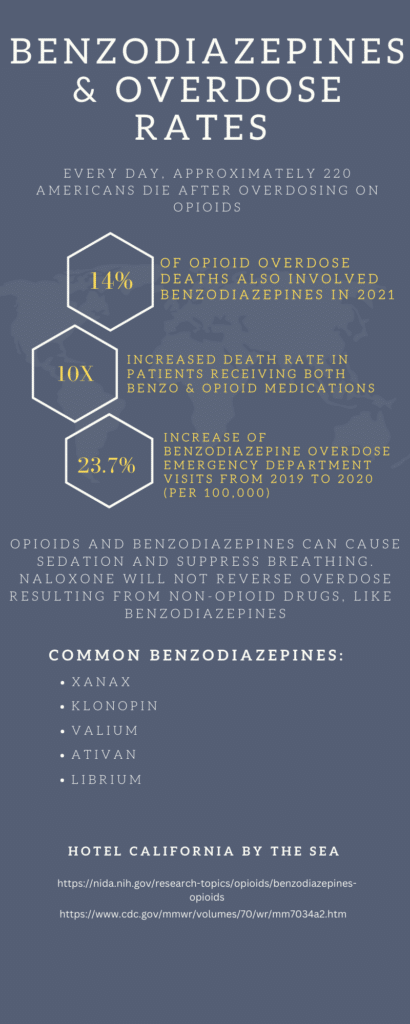Benzodiazepines Addiction Treatment
What are benzodiazepines? Why are they addictive? Benzodiazepines or benzos are central nervous system depressant drugs that slow down the messaging activity between the brain and the body. These types of medications are often prescribed to help people who have issues with anxiety, panic disorders, sleep disorders and seizures. It is also used to treat psychiatric symptoms of alcohol withdrawal.
Benzos have become such a commonly used and available drug. Research has found that over 50 million people receive prescriptions for benzos annually. Between 11-15% of Americans have some sort of benzos drug in their medicine cabinet at home. When used as recommended for a short period of time, benzos can be extremely effective in treatment. However, long-term use could lead to higher tolerance, dependence and the development of benzos drug addiction.

Signs you may need Benzodiazepines Addiction Treatment
- Impaired judgment and decision making
- Doctor shopping (going to multiple doctors in order to get multiple prescriptions)
- Taking medications not prescribed to you by friends and family
- Extreme mood swings
- Risk-taking behaviors
- Drowsiness and lethargy
- Attempting to cut back on the volume of drugs taken but are unable to
- Combining benzos with other types of mind-altering substances
Why Benzodiazepines are Addictive
The name benzodiazepine comes from the make up of its chemical structure. The compound includes a benzene ring and a diazepine ring. Benzos are a class of psychoactive drugs that enhance the effects of the GABA chemical in the brain. The gamma-aminobutyric acid is a neurotransmitter in the brain that is responsible for functions such as reasoning, memory, emotions and even breathing. When benzos enter the body, it slows down the effects of the GABA chemicals to produce feelings of calm and intense relaxation.
Oftentimes the intense feeling of euphoria experienced from taking benzos becomes addictive. With benzos, the longer a person uses it, the more tolerant and dependent they will become on the drug. There are many causes and risk factors for developing an addiction to benzos.
- Long-term use of benzos beyond four weeks
- Use of high or increasingly high doses of benzos
- Simultaneous abuse of benzos with other drugs such as alcohol
- Pre-existing conditions of anxiety disorders or other conditions in which benzos are used to treat
Benzos are normally prescribed to help treat anxiety, relieve stress and help with sleeping disorders such as insomnia. There are three main types of benzos: long, intermediate and short-acting. Short-acting benzos are usually prescribed to treat anxiety and for sedation in critical care situations. They can become extremely addictive. Long-acting benzos help treat individuals with insomnia or daytime anxiety. Popular benzo medications include Valium, Klonopin, Xanax and Ativan.

All benzos have the potential to become addictive if used for more than 3-4 weeks. One of the most addictive benzodiazepines is clonazepam.
- Clonazepam (Klonopin) – The most addictive and most frequently prescribed to patients. It produces the greatest feelings of euphoria where users can easily develop a tolerance.
- Alprazolam (Xanax) – This is another highly addictive and often prescribed medication for anxiety and insomnia. It is known as a party drug and is often taken alongside alcohol. It can quickly produce short-term effects.
- Diazepam (Valium) – This is used to treat anxiety, panic disorders and insomnia. It is most likely to make a person fall asleep more easily.
- Lorazepam (Ativan) – This medication is most frequently used in a hospital setting to prevent and treat anxiety and panic disorders. It is not as widely prescribed and can be more difficult to develop a dependence on.
- Triazolam (Halcion) – This medication is used to treat anxiety disorders. It is a less well-known drug and the risk of dependence is much lower. It is one of the least addictive benzodiazepines.
Check Your Insurance Coverage for FREE
Find out if your insurance covers addiction treatment in minutes. We accept most insurance!
Behavioral Symptoms of Benzos Addiction
Benzodiazepines are drugs that slow down activity in the brain and body producing a sense of euphoria. While in this intense relaxation state of mind, individuals may also experience increased depression, impaired thinking and memory loss, hallucinations, delusions, and difficulties with concentration. During this time individuals can experience extreme mood swings making their behaviors, thoughts and actions completely out of character.
Physical Side Effects of Benzos Addiction
Benzos are prescription medications used to help individuals cope with co-occurring mental health conditions associated with high stress and anxiety. While taken correctly as prescribed, these medications can be beneficial for individuals who are suffering from these mental health disorders. But similar to other drugs, with long-term use of benzos, there is a high risk of abuse and addiction. Some of the physical side effects of benzos include drowsiness and fatigue, slurred speech, double or impaired vision, stiffness, weakness, GI issues and flu-like symptoms.
Benzos Withdrawal
Taking benzos for longer than 4 weeks can result in a high dependence and even addiction to the drug. When the drug is abruptly stopped or drastically reduced, it can cause symptoms of withdrawal.
General Withdrawal Symptoms:
- Headache
- Palpitations
- Sweating
Musculoskeletal Symptoms:
- Tremors
- Muscle pain
- Stiffness and aches in back limbs, neck and jaw
Neurological Symptoms:
- Dizziness and lightheadedness
- Paraesthesia
- Shooting pains in the neck and spine
- Visual disturbances
- Tinnitus
- Faintness and dizziness
- Confusion and disorientation
- Delirium and delusions
- Paranoia, hallucinations and grand mal seizures
Gastrointestinal Symptoms:
- Nausea
- Anorexia
- Diarrhea
Psychological Symptoms:
- Rebound insomnia –
- Nightmares
- Anxiety and panic attacks
- Agitation and irritability
- Poor memory and concentration
- Perceptual distortions
- A distorted image of the body
- Feelings of unreality
- Depression
Benzo Withdrawal Timeline
- 6-8 hours – The first signs of withdrawal typically include anxiety and insomnia
- 1-4 days – During this phase, feelings of intense discomfort from rebound insomnia and increased anxiety is common. Other symptoms that peak include increased heart and breathing rate
- 10-14 days – In this phase, the withdrawal symptoms for longer-acting benzos begin to fade
- 15 or more days – For those who are heavily dependent on benzos, post acute withdrawal symptoms (PAWS) can occur. PAWS is defined as random periods of sharp and intense withdrawal symptoms months after quitting the initial drug. Side effects of PAWS include persistent anxiety, chronic insomnia, difficulty performing or completing tasks, poor concentration and depression
Reach out to Hotel California by the Sea
We specialize in treating addiction and other co-occurring disorders, such as PTSD. Our Admissions specialists are available to walk you through the best options for treating your addiction.
Benzodiazepines Addiction Treatment
The availability and accessibility of benzos have led to an alarming increase in addiction to these types of prescription medications. Hotel California by the Sea offers evidence-based treatment options to help those from all walks of life. Specializing in dual diagnosis treatments, unique therapies such as CBT and EMDR therapy help patients alleviate symptoms of mental illnesses associated with benzos addiction. Our benzodiazepine addiction treatment program provides a full continuum of care including detox, residential and outpatient programs. A multidisciplinary approach for benzos addiction treatment can produce a greater chance of long-term recovery.
References:
https://www.ashevillerecoverycenter.com/top-5-most-addictive-benzos/
https://www.ncbi.nlm.nih.gov/pmc/articles/PMC4657308/
https://www.addictioncenter.com/benzodiazepines/benzodiazepine-withdrawal-and-detox/
